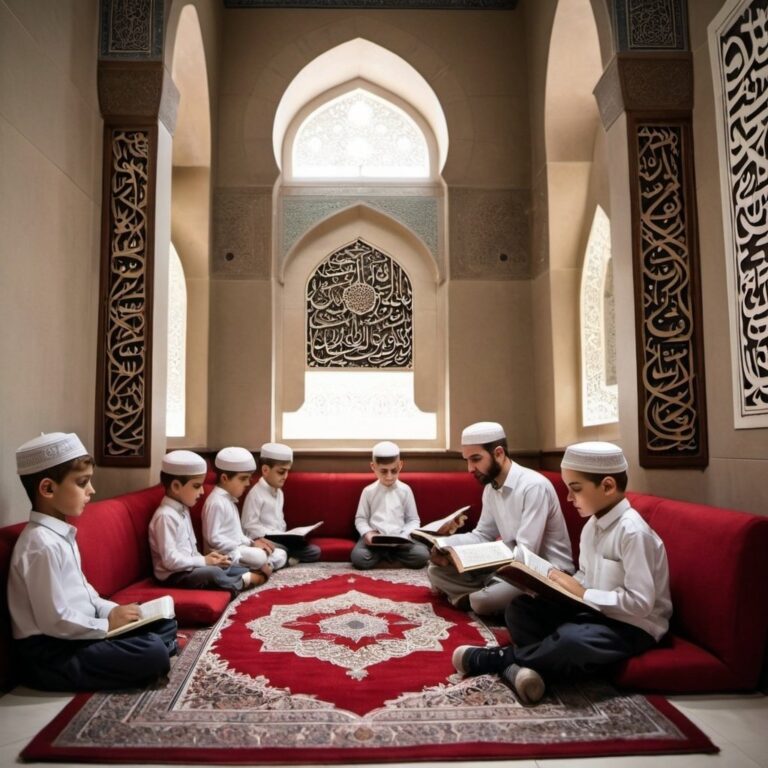Embrace the Sacred: A Journey Through Dhul Hijjah
The Islamic calendar is adorned with sacred months that keep gigantic non secular importance for Muslims round the sector. Among those, the month of Dhul Hijjah stands out as a time of profound reflection, worship, and network. This weblog put up delves into the fine 10 days of Dhul Hijjah, exploring their religious importance and the numerous practices associated with them. Our goal is to offer insights on the way to assist Muslims global completely embody the benefits of this sacred length.

Introduction to Dhul Hijjah and Its Significance in Islam
The month of Dhul Hijjah, the 12th month of the Islamic lunar calendar, is a length of large religious importance in Islam. It is in the course of this month that millions of Muslims from around the world adopt the pilgrimage of Hajj, one of the 5 pillars of Islam. Additionally, the first ten days of Dhul Hijjah are considered the satisfactory days of the year, full of unparalleled possibilities for worship and desirable deeds. The importance of Dhul Hijjah is deeply rooted in Islamic subculture, imparting Muslims a threat to resume their religion and are trying to find closeness to Allah.
Dhul Hijjah is not just about performing rituals; it’s miles a time for introspection, repentance, and religious renewal. The Prophet Muhammad (peace be upon him) emphasised the importance of nowadays, mentioning that no deeds are extra liked to Allah than those completed at some stage in the primary ten days of Dhul Hijjah. For Muslims, this month serves as a reminder of the virtues of patience, gratitude, and sacrifice.
The Sacred Days Of Dhul Hijjah: Amplifying Your Spiritual Journey With Adhkar
In this weblog, we will discover various factors of Dhul Hijjah, from its non secular practices to the rites of Hajj and the importance of Qurbani. Whether you are a pilgrim preparing for Hajj or someone seeking to deepen your knowledge of Islamic traditions, this guide ambitions to offer valuable insights and practical suggestions for making the maximum of this blessed month.
The Best 10 Days of Dhul Hijjah: Spiritual Importance and Practices
Fasting, Prayers, and Dhikr During These Days
The first ten days of Dhul Hijjah are a sacred duration marked with the aid of accelerated devotion and worship. Fasting at some point of these days, particularly at the Day of Arafah (the 9th day), holds great rewards. The Prophet (peace be upon him) stated, “Fasting at the Day of Arafah expiates the sins of the previous yr and the coming 12 months” (Muslim). This highlights the significance of fasting as a means of seeking forgiveness and purifying oneself.
In addition to fasting, Muslims are recommended to have interaction in more prayers and dhikr (remembrance of Allah). The Tahajjud prayer, an optionally available past due-night prayer, is particularly meritorious at some stage in in recent times. Reciting the Takbeer, Tahmeed, and Tasbeeh (Allahu Akbar, Alhamdulillah, SubhanAllah) frequently is likewise enormously encouraged. These acts of worship serve to raise one’s spiritual country and draw toward Allah.
Dhikr, or the remembrance of Allah, is a middle practice throughout the first ten days of Dhul Hijjah. Muslims are recommended to recite terms like “SubhanAllah” (Glory be to Allah), “Alhamdulillah” (All reward is due to Allah), and “Allahu Akbar” (Allah is the Greatest). These terms function constant reminders of Allah’s greatness and mercy, assisting to domesticate a coronary heart that is conscious of divine presence.
Importance of Good Deeds and Their Multiplied Rewards
The first ten days of Dhul Hijjah are a golden opportunity for acting appropriate deeds, as their rewards are considerably elevated at some point of this era. Acts of charity, kindness, and generosity are tremendously endorsed. The Prophet Muhammad (peace be upon him) emphasized that no appropriate deeds are more cherished to Allah than the ones accomplished at some point of in recent times. Therefore, Muslims are entreated to interact in acts of worship, charity, and service to others.
Charitable activities, consisting of giving to the bad, helping community initiatives, and supporting those in need, are mainly commendable for the duration of Dhul Hijjah. The rewards for those movements are exponentially greater, making it an ideal time to maximize one’s religious gains. Moreover, carrying out correct deeds fosters a experience of network and solidarity among Muslims, reflecting the widely wide-spread values of Islam.
Good deeds aren’t confined to acts of charity on my own. Simple actions like smiling at a person, assisting a neighbor, or even supplying a kind phrase can be immensely worthwhile. These small acts of kindness collect and make contributions to someone’s usual non secular properly-being. The first ten days of Dhul Hijjah function a reminder that each desirable deed, regardless of how small, holds tremendous cost within the eyes of Allah.
Hajj: The Fifth Pillar of Islam
A Brief Overview of Hajj and Its Spiritual Significance
Hajj, the 5th pillar of Islam, is an annual pilgrimage to the holy town of Mecca that each Muslim should undertake at least once of their lifetime if they are bodily and financially capable. It is a profound act of worship that commemorates the pains and sacrifices of the Prophet Ibrahim (Abraham) and his circle of relatives. Hajj gives Muslims an unparalleled opportunity for religious renewal and forgiveness.
The non secular significance of Hajj is large, because it serves as a journey of self-purification and devotion to Allah. Pilgrims don simple white clothes referred to as Ihram, symbolizing equality and solidarity amongst all Muslims. This apparel strips away distinctions of wealth, fame, and nationality, emphasizing the oneness of the Muslim Ummah (community). The rituals of Hajj, which includes Tawaf (circumambulating the Kaaba) and Sa’i (walking between the hills of Safa and Marwah), are acts of worship that carry pilgrims towards Allah.
Hajj isn’t always only a bodily journey but also a deeply non secular one. It represents a microcosm of lifestyles, with its trials, challenges, and moments of profound mirrored image. Pilgrims interact in excessive prayer, supplication, and acts of devotion, looking for Allah’s mercy and forgiveness. The revel in of Hajj leaves an indelible mark on the hearts and minds of folks who undertake it, reinforcing their religion and dedication to Islam.
The Rites of Hajj and Their Symbolism
The rites of Hajj are rich in symbolism and convey deep religious meanings. One of the key rituals is Tawaf, wherein pilgrims circumambulate the Kaaba seven times in a counterclockwise direction. This act symbolizes the cohesion of believers inside the worship of the One God and their non-stop movement closer to Him. The Kaaba, placed inside the Masjid al-Haram in Mecca, is the holiest website in Islam and serves as the point of interest of Muslims’ prayers.
Another good sized ceremony is Sa’i, which includes on foot seven times between the hills of Safa and Marwah. This ritual commemorates the desperate search for water by using Hagar, the wife of Prophet Ibrahim, for her son Ismail. It is a effective reminder of religion, perseverance, and reliance on Allah. The well of Zamzam, which miraculously appeared at some stage in Hagar’s search, keeps to float to this present day, offering water to thousands and thousands of pilgrims.
The standing at Arafah (Wuquf) is the top of Hajj, in which pilgrims gather on the obvious of Arafah to are trying to find forgiveness and make heartfelt supplications. This day is frequently known as the “Day of Arafah” and is considered the maximum important day of Hajj. The Wuquf at Arafah symbolizes the collection of humanity at the Day of Judgment, emphasizing the issues of responsibility and divine mercy.
The Global Muslim Community and the Hajj Journey
Hajj is a completely unique occasion that brings together Muslims from all corners of the globe, transcending cultural, linguistic, and geographical obstacles. It is a effective manifestation of the harmony and diversity of the Muslim Ummah. Pilgrims from distinctive backgrounds come together with a not unusual cause: to worship Allah and fulfill one of the fundamental pillars in their faith.
The journey of Hajj fosters a feel of brotherhood and sisterhood amongst Muslims. Pilgrims proportion hotels, food, and experiences, forging bonds that frequently remaining an entire life. The collective acts of worship, such as standing shoulder to shoulder in prayer and acting Tawaf together, reinforce the concept of unity and cohesion. Hajj serves as a reminder that regardless of our variations, we’re all same inside the eyes of Allah.
The impact of Hajj extends past the individual pilgrim to the broader Muslim community. Upon returning domestic, pilgrims frequently percentage their stories and insights, inspiring others to deepen their religion and dedication to Islam. The classes found out throughout Hajj, such as endurance, humility, and compassion, have a ripple impact, influencing the wider network and fostering a spirit of harmony and cooperation.
Qurbani (Sacrifice) and Its Meaning
The Tradition of Qurbani During Eid al-Adha
Qurbani, or the act of sacrifice, is an critical a part of the Islamic festival of Eid al-Adha, which occurs for the duration of the month of Dhul Hijjah. This culture commemorates the willingness of Prophet Ibrahim to sacrifice his son Ismail in obedience to Allah’s command. Ultimately, Allah provided a ram to be sacrificed as an alternative, highlighting the importance of obedience and accept as true with in divine awareness.
The act of Qurbani entails the ritual slaughter of an animal, typically a sheep, goat, cow, or camel, to honor this momentous occasion. The meat from the sacrifice is divided into 3 elements: one-third for the individual or circle of relatives performing the sacrifice, one-1/3 for buddies and family, and one-1/3 for the much less lucky. This distribution ensures that the advantages of Eid al-Adha are shared with the wider network, fostering a spirit of generosity and compassion.
The lifestyle of Qurbani is a poignant reminder of the values of sacrifice and submission to Allah’s will. It encourages Muslims to reflect on their personal willingness to make sacrifices of their lives, whether or not in terms of time, wealth, or private desires, for the sake of their religion and the extra good of the community.
The Importance of Qurbani in Dhul Hijjah
The significance of Qurbani extends beyond the act of sacrifice itself. It is a time for Muslims to mirror at the deeper meanings of sacrifice, devotion, and selflessness. By taking part in Qurbani, Muslims demonstrate their dedication to those values and their willingness to comply with within the footsteps of Prophet Ibrahim.
Performing Qurbani for the duration of the first ten days of Dhul Hijjah holds unique advantage. The act of sacrifice is visible as a means of drawing closer to Allah and searching for His satisfaction. It is an opportunity for Muslims to resume their religion and fortify their clear up to stay according to Islamic principles. The rewards for Qurbani are believed to be big, both in this international and the hereafter.
The exercise of Qurbani additionally serves as a reminder of the interconnectedness of the Muslim network. By distributing the meat to those in want, Muslims ensure that the benefits of Eid al-Adha are shared with the less lucky. This act of charity reinforces the standards of social justice and compassion, which can be vital to the teachings of Islam.
How Qurbani Reflects the Concept of Sacrifice in Islam
The concept of sacrifice is deeply embedded in Islamic teachings and is exemplified thru the practice of Qurbani. Sacrifice in Islam isn’t simply approximately the physical act of slaughtering an animal; it’s miles approximately the willingness to surrender something valuable for the sake of Allah. This can take many bureaucracy, along with sacrificing one’s time, wealth, or non-public desires to fulfill spiritual duties and serve the community.
Qurbani serves as a tangible expression of this broader idea of sacrifice. It is a reminder that proper devotion to Allah calls for a willingness to make non-public sacrifices and to prioritize faith over worldly concerns. The tale of Prophet Ibrahim and his unwavering obedience to Allah’s command serves as an enduring instance of the depth of religion and accept as true with that Muslims are endorsed to emulate.
In essence, Qurbani is a reflection of the wider Islamic precept of selflessness and willpower to the extra right. It encourages Muslims to appearance beyond their very own wishes and to recollect the welfare of others. By embodying these values, Muslims fortify their dating with Allah and make contributions to the properly-being of the broader network.
The Day of Arafah: Its Importance and Significance
The Historical Significance of the Day of Arafah
The Day of Arafah, which falls on the ninth day of Dhul Hijjah, is one of the maximum tremendous days in the Islamic calendar. It is the day whilst pilgrims accumulate on the apparent of Arafah, near Mecca, to carry out the Wuquf (standing) ritual as a part of the Hajj pilgrimage. This day holds colossal historical and religious importance, as it changed into in this day that the Prophet Muhammad (peace be upon him) delivered his Farewell Sermon at some stage in his very last pilgrimage.
The Farewell Sermon, added on the plain of Arafah, is a cornerstone of Islamic teachings. In this sermon, the Prophet Muhammad (peace be upon him) emphasised key principles of justice, equality, and the sanctity of lifestyles and property. He addressed the rights and duties of Muslims, the importance of solidarity, and the want to uphold ethical behavior. The Day of Arafah serves as a reminder of these timeless teachings and their relevance in our lives nowadays.
The ancient importance of the Day of Arafah is in addition underscored via its connection to the broader narrative of Hajj. The Wuquf at Arafah is considered the pinnacle of the Hajj pilgrimage, symbolizing the remaining act of submission and devotion to Allah. Pilgrims spend the day in intense prayer, supplication, and mirrored image, searching for forgiveness and spiritual renewal.
The Spiritual Importance of Fasting at the Day of Arafah
For Muslims who are not acting Hajj, fasting on the Day of Arafah holds sizeable non secular significance. The Prophet Muhammad (peace be upon him) said, “Fasting on the Day of Arafah expiates the sins of the previous 12 months and the approaching year” (Muslim). This highlights the profound spiritual benefits of fasting in this day, as it serves as a means of searching for Allah’s forgiveness and mercy.
Fasting at the Day of Arafah is a deeply worthwhile act of worship that lets in Muslims to partake in the spiritual advantages of this sacred day. It is an opportunity to purify oneself, repent for past errors, and are looking for a sparkling start. The act of fasting itself is a form of strength of mind and devotion, reinforcing the values of endurance and humility.
The Unity and Equality Demonstrated on the Day of Arafah
The Day of Arafah embodies the spirit of team spirit and equality among Muslims around the world. Regardless of socio-economic fame, nationality, or ethnicity, pilgrims collect collectively on the obvious of Arafah in a show of standard cohesion and brotherhood. Clad in easy white garments, called Ihram, they stand shoulder to shoulder, signifying that within the eyes of Allah, all believers are same. This communal act of worship underscores the inclusive and egalitarian nature of Islam.
This demonstration of harmony extends beyond the plains of Arafah, attaining Muslims throughout the globe. Those who aren’t performing Hajj interact in various acts of worship, together with fasting, greater prayers, and charity, aligning their hearts with the pilgrims in Arafah. This shared observance fosters a global feel of community and reminds Muslims of their collective obligation in the direction of each other.

The Role of Supplication on the Day of Arafah
Supplication, or Du’a, is a principal thing of worship on the Day of Arafah. Pilgrims devote an awful lot of the day to creating heartfelt supplications, searching for forgiveness, guidance, and blessings from Allah. The Prophet Muhammad (peace be upon him) emphasised the power of Du’a in this day, declaring, “The pleasant supplication is that which is made at the Day of Arafah” (Tirmidhi).
For Muslims not on pilgrimage, making earnest supplications is similarly endorsed. It is a time to open one’s coronary heart to Allah, specific gratitude, and are seeking His mercy and compassion. The Day of Arafah is seen as a unique opportunity to have prayers spoke back and to forge a deeper spiritual connection with the Creator.
Conclusion: The Timeless Relevance of the Day of Arafah
The Day of Arafah serves as a profound reminder of the center concepts of Islam: faith, harmony, equality, and devotion. It is an afternoon that compels Muslims to reflect on the essence of their faith and renew their commitment to the teachings of Islam. Whether collaborating inside the Hajj pilgrimage or watching the day from afar, the Day of Arafah holds a special area in the hearts of Muslims global, serving as a powerful catalyst for religious boom and communal harmony.








